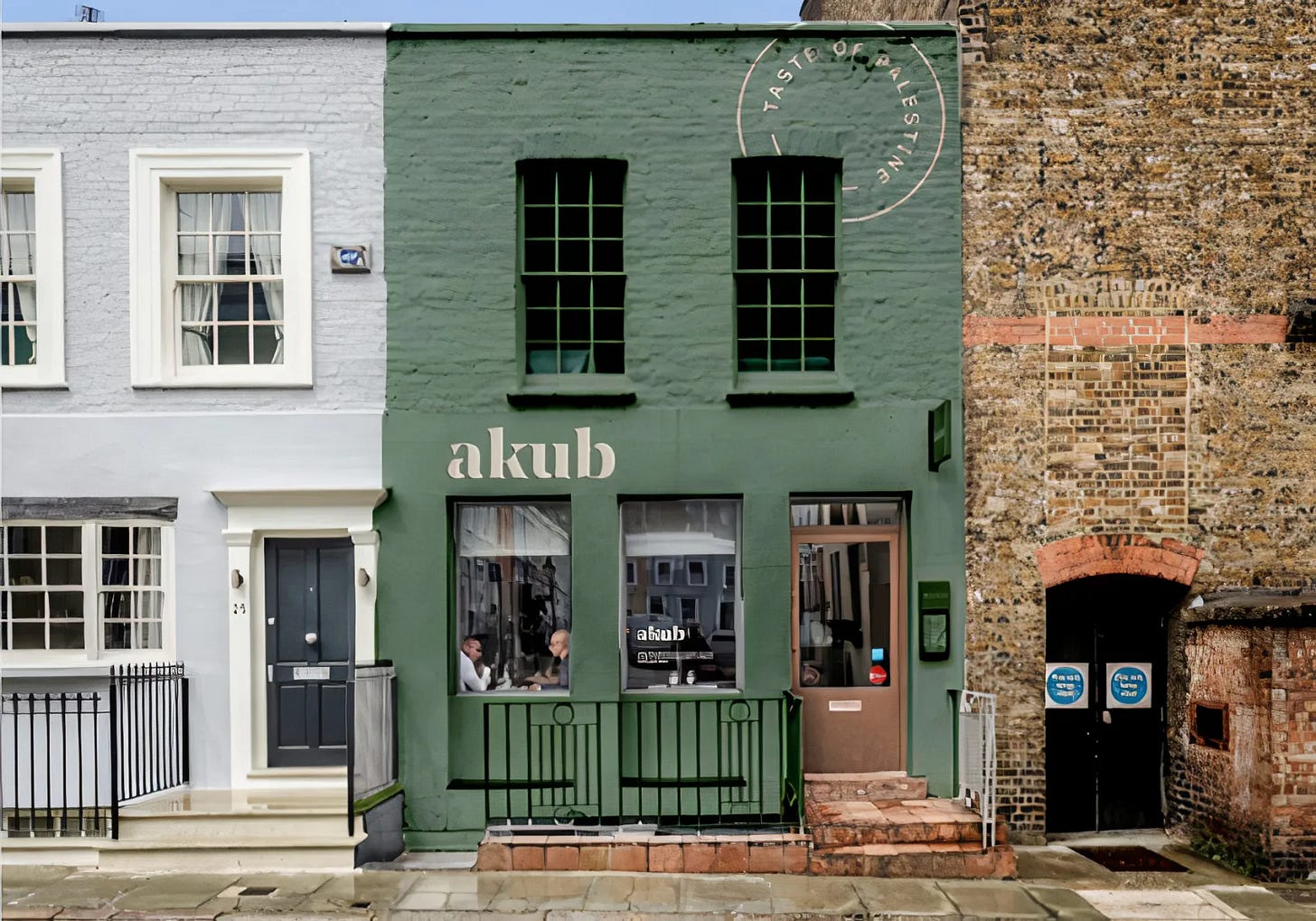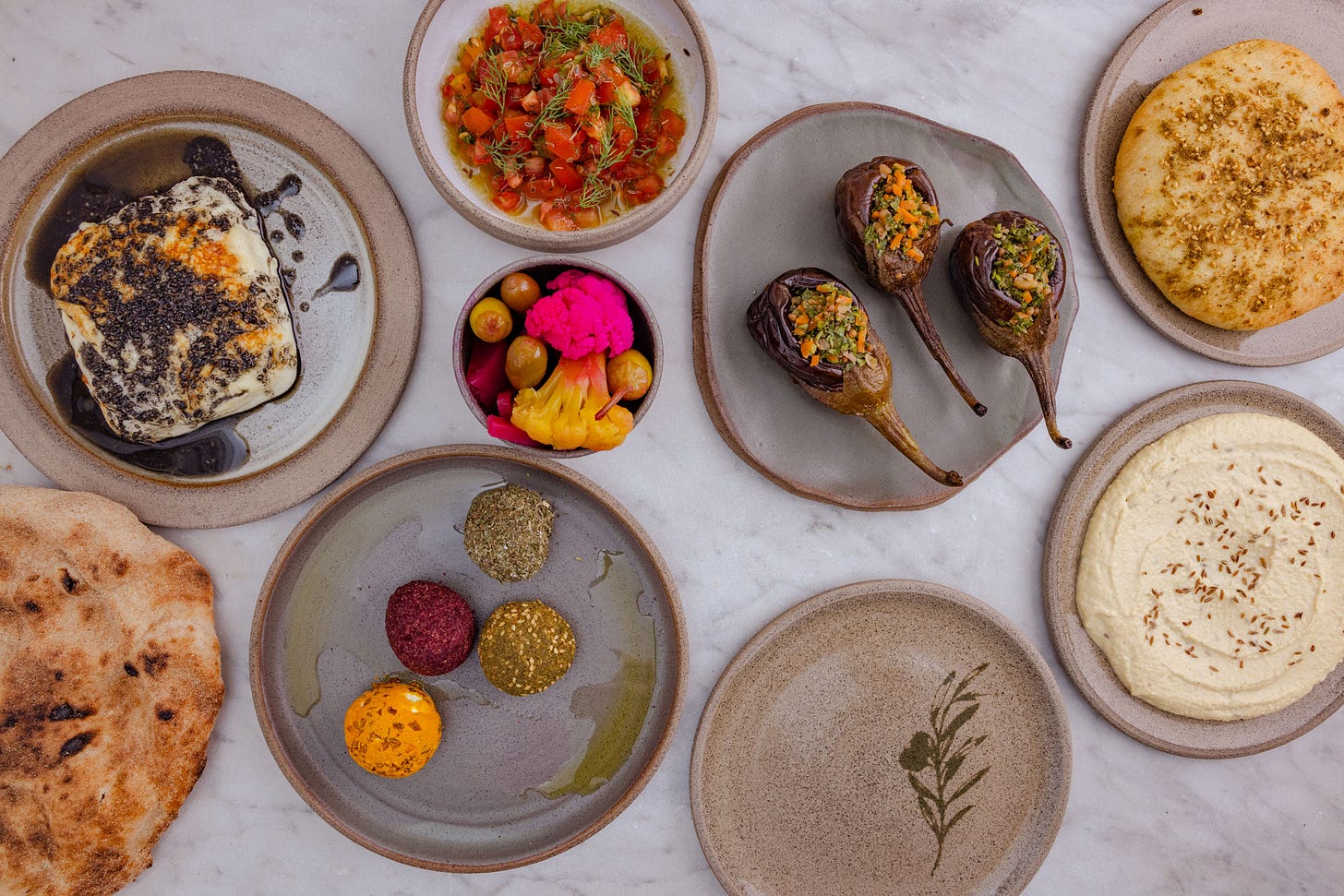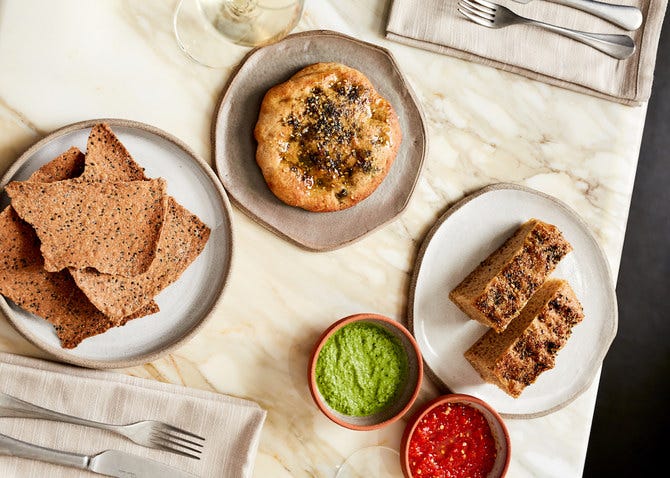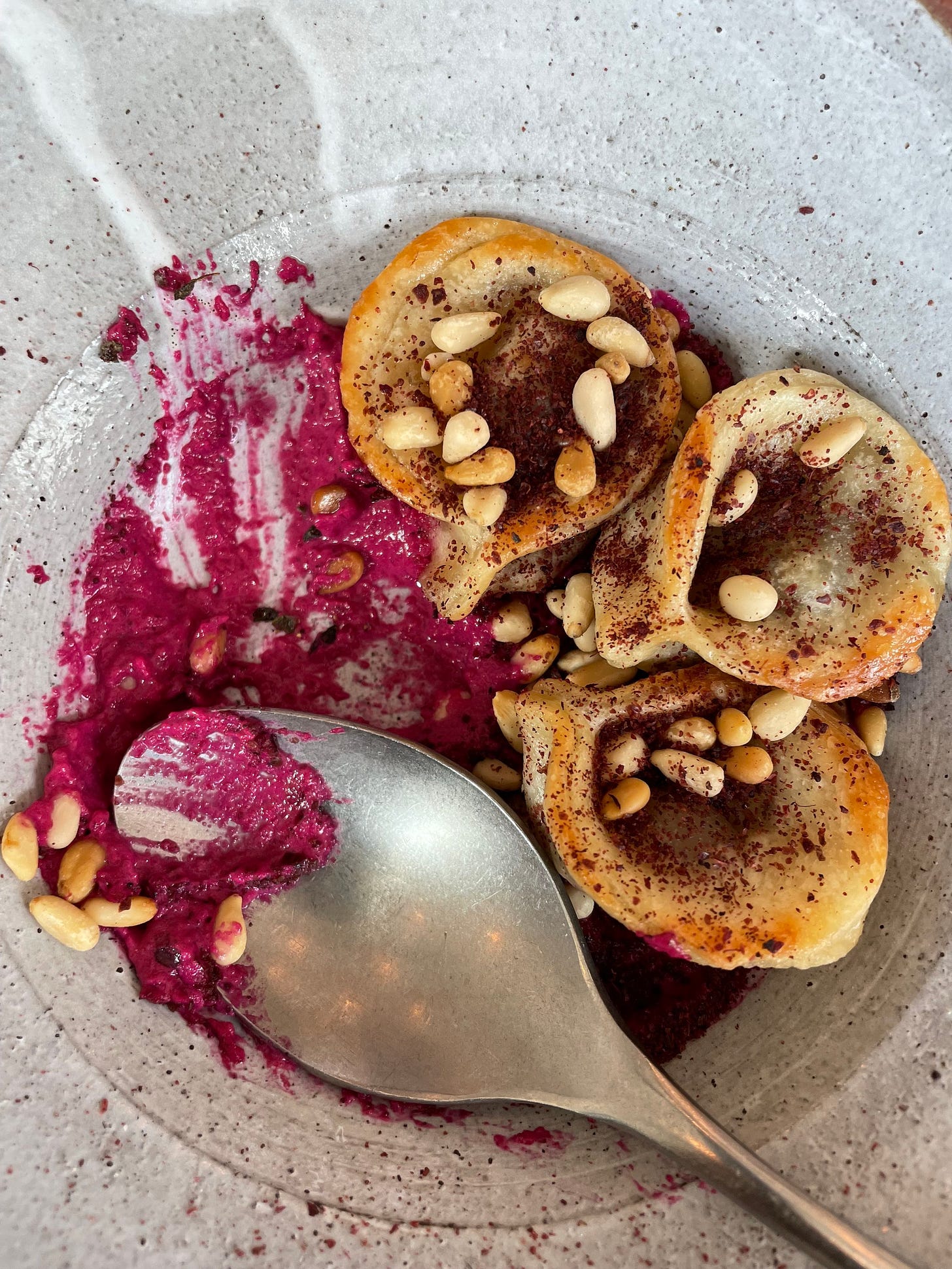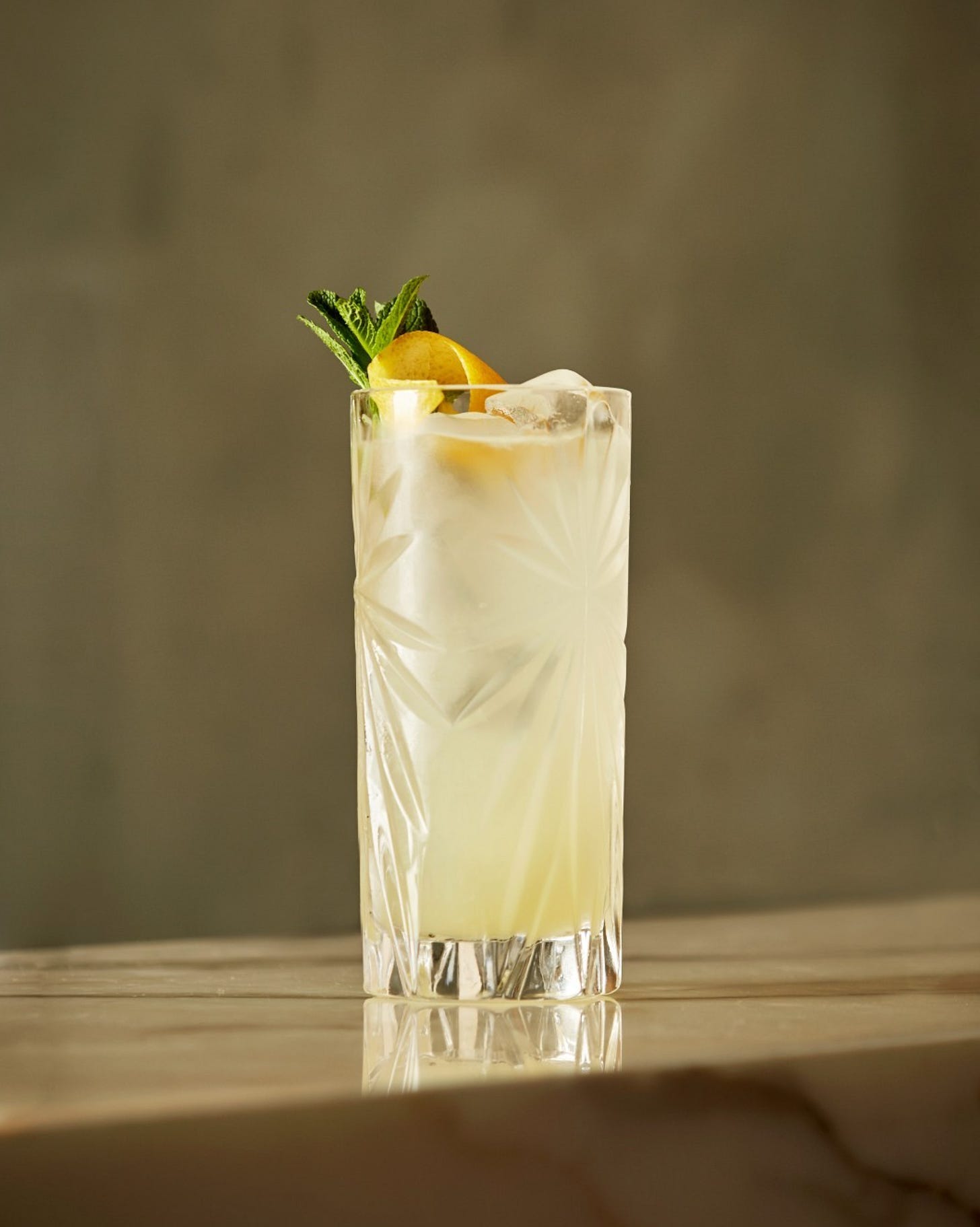akub review
Situated on a picturesque street of Notting Hill, akub is a Palestinian restaurant celebrating the rich diversity of ingredients and culinary traditions from the region.
The first restaurant that we visited was akub in West London, a Palestinian restaurant, of which the trip has clearly been inspired by recent events that we all feel passionate about. I had very few experiences with Middle Eastern cuisine before this experience, as it had mostly been limited to one friend growing up and many limitations on what I could eat at their house because of allergies and intolerances. My initial impression was that it would be close to the Mediterranean food I had tried before, which I experienced to be more herbaceous and spiced. For this reason, I was actually worried that I wouldn’t really like anything as I come from a culture with heavier and saltier foods.
From the pictures of akub that were available online, I expected more of a minimalist culinary experience that was more focused on tasting than filling up my belly, which I was okay with. After all, I am from Wembley which has loads of late night options if I still felt peckish afterwards.
We’d also heard of the notorious Palestinian hospitality, and as a group of Black diners hospitality is something that we are often denied. I think that everyone was intrigued by what kind of service and hospitality we would receive as hospitality seemed to be so deeply embedded into all of our experiences in every type of business.
As it was my first time organising around a restaurant, I knew I was likely to make mistakes and I was absolutely dreading it. I found the process of booking for a larger group to be quite difficult. The restaurant needed us to send an email with information about the booking and in return we got a menu with a request of what we would like. As we were a group of more than six people we didn’t have an option to order single plates, instead we had to eat from a sharing menu. Accounting for fifteen people with a range of dietary needs, including religious, allergen and neurodivergence, was incredibly difficult with this style of booking and plating.
We did soldier through because, as I said, everyone was really keen to try Palestinian food and to support a Palestinian business. To combat this, I sent out the menu with a survey to gather what everyone would like from the menu. We were limited to “a pre-order of 4 starters and 3 mains, plus either a choice of the Fateh or the Shish Barak”. Luckily, my friends all wanted the same four starters and three mains, so everyone was catered for. Muslims in the group had the vegan option as the meat was not halal.
The atmosphere upon entrance was welcome. It was an incredibly cold and windy day, there were numerous delays on public transport that made our journey’s even more debilitating and I think we were all anxious to see one another. As stated above, very few of these friends knew one another but as loneliness ravages London as it is with other major cities, I would like to think my friends were excited to meet each other.
Yemi was the first one there. She was sitting in the corner of our long table that had beautiful dim lighting that pushed us into comfortability mode even further.
Over the next half an hour other friends arrived, all thoroughly shaken from the wind and the stressful journeys from across the city and one from Buckinghamshire.
Still, we were here and we were together. And as is the case with all of my friends, they were ready to support me in my new project. This support was welcome, as the Eating with Friends is a project about them. There was mutual love here.
The decor of akub is loads of soft tones, golds and greens. Anyone who knows me knows that green is my favourite colour, so I appreciated this so much more. I sat in the middle of the table so that I could have a hand in any conversation, especially to facilitate in case it got awkward among strangers. It was unnecessary, my friends are all talkative and friendly.
Our impression of management was that they were cold, but we had one server in particular, a blonde woman whose name I stupidly didn’t get, who became the focal point of our service. She was friendly, proactive, professional and quick to educate us on what we were eating (the meals names were Arabic which no one at the table is a native speaker of) and what ingredients they contained. We were especially grateful for her as the other server who waited on us throughout the night was new and being trained and knew next to nothing about the plates being served. My friends were stunned and disappointed that he’d mislabelled the meat in one of the dishes (of which, one of my guests couldn’t eat but had put it on her plate) and said “I don’t know” when asked what was in another dish. They would have preferred him to say “I don’t know, but let me find out or ask”, as is the standard for good service.
To start we had the Labaneh, Dagga Ghazzawieh, Mafghoussa and Siek Siyami. Our opening breads were served with both green and red chilli-based pickled sides. For me, this was one of the highlights of the meal. To open and have all of our plates placed on the table, the experience of picking and choosing what we wanted and how much, and the ritual of consideration involved “do you want more?” and “do you want to share that last bit?” was perfect for the environment I wanted to create for my friends. There is so much selfishness in the world right now, but these small acts of everyday consideration and kindness helps to keep the political mind sane and safe from defeatism.
I’m a true meat lover but I genuinely enjoyed the vegetable forward starters, my favourite of which was definitely the Mafghoussa, closely followed by the Dagga Ghazzawieh. The Mafghoussa, a chunky courgette and tomato salad was perfect for introducing us to the fullness of a veggie plate.
The chunkiness of the courgette satisfied in me what has long kept me away from vegetarian and vegan meals because they had so much body. The tomatoes were clearly sourced well, not the mushy crap that is frequently distributed in British supermarkets, but firm, sweet and tangy.
The Dagga Ghazzawieh was appreciated for the same reason, and anyone who loves garlic as much as I do will firmly appreciate this vibrant and wholesome mix of Spicy tomato, onion, chilli, garlic, dill and lemon juice, that was just absolutely perfect.
Herein, I find appreciation for the Palestinian respect for the fruit and vegetable. I have seen the images of Palestinian farmers clinging to their olive trees as the IOF bulldozes their plants and learned about the use of the watermelon as an act of peaceful resistance against the outlawing of the Palestinian flag. The tenderness and care with which these dishes were prepared are inspiring and remind me of the relationship between flora and fauna, and the indigenous people of a land who are given the responsibility of caring for them. This is fully represented on the plate.
It was around this time that I got word that two of my guests could not come as they had been involved in a car accident with one of them breaking a wrist. I was worried of course, but encouraged to enjoy my night as they were more upset about missing the company than the harm to the wrist.
Another highlight for me were the drinks, something that I know my friend Ayo also appreciated, as we both went absolutely insane for them and devastated our bank accounts in the process. If I was worried about the herbaceousness of the food I didn’t need to worry, because they were certainly used well in the cocktails. The Qamardeen Dreaming and Desert Flower were our favourite drinks as we clearly have an affinity for the fruitier drinks. We ordered many and were very merry by the time our mains arrived.
For my sober friends, like Salome, the winner seemed to be Fadi’s Lemonade. I also tried this drink and it was a unique lemonade. As I get older, I stay away from drinks like lemonade as they’re too sweet and I need to cleanse my palette (and my mouth to be honest) with water afterwards. However, these lemonades were truly refreshing and were enjoyed by the adults and one of our very young diners, Ava.
For mains we had the Crunchy Mansaf, Shish Barak and Short Rib Fatteh. I found the former two to be forgettable but the Short Rib Fatteh was central to the meals of my friends who also eat non-halal meat. I think this was about body, tanginess and the crispy focaccia stabbed into the bowl, which was akin to the comforting experience of scooping comfort food like chilli beef on nachos and catching it in our mouths. Not to mention, the beauty of sprinkling pomegranates over the meal. If I was concerned about not being full, the Short Rib Fatteh ensured that we were.
It cost us £58 per person, excluding a mandatory service charge and the flow of drinks that we had. Two friends had to leave and it is at this point that two friends had to leave, with Shimon telling us that the manager has told him that we must pay for the friends who did not show up. I did try to negotiate with this manager about this afterwards, especially as we didn’t know until we were into the first course about the car accident and the broken wrist but it was unfortunate that he was immovable. I did try to explain about the car accident but it was made clear that they did not care because we were asked at the beginning if the full number of people would be arriving. Thankfully, my friends were moveable, and we split the remaining amount between all of us.
That part of the experience has led me to change the way that I organise around service charges and no-shows. Life happens, you know? And the kind of service that is appropriate for my group is the kind that accounts for this and the visible stress of the organiser who is unsure how they will cover the cost of three no-shows. I recognise that this is a limitation of organising specifically within the independent business space as I was told by the manager “we could have given those three seats to someone else” as a reason we could not meet in the middle.
For this reason, most of my friends felt like they did not get their value for money, which was a shame
Overall, akub is a comfortable restaurant and a great introduction to Palestinian cuisine. There was no separation between this restaurant and the plight of the Palestinian people, as the food fights for its cultural right to be respected on the London food scene, beyond the ingredients and even within the style of group sharing plates. As young Black Londoners, it was our intention to create a space where it was safe to discuss our support for the Palestinian right to self determination and our support for Palestinian liberation movements. With the loneliness crisis in London getting worse with inflation and an impending recession I sought to combat iit through my love for food, dining and adventure and my brave friends agreed to go on this journey with me.
I’m grateful for our experience with akub and I would go again, but with a much smaller group so that I can have a plate of food to myself and experience the full scope of the menu.
As always, Free Palestine.
Collective Review:
Collective reviews are scored out of 5. They are the average score from everyone who dined with us.
Ambiance and Atmosphere: 4.5
Service: 3.6
Food: 4.1
Drinks: 3.8
Value for Money: 2.8
To learn more about Palestine here are some resources:
The Hundred Years' War on Palestine by Rashid Khalidi
Ten Myths About Israel by Ilan Pappé
On Palestine by Ilan Pappé
Manufacturing Consent by Noam Chomsky
Images were sourced from the official akub instagram account




